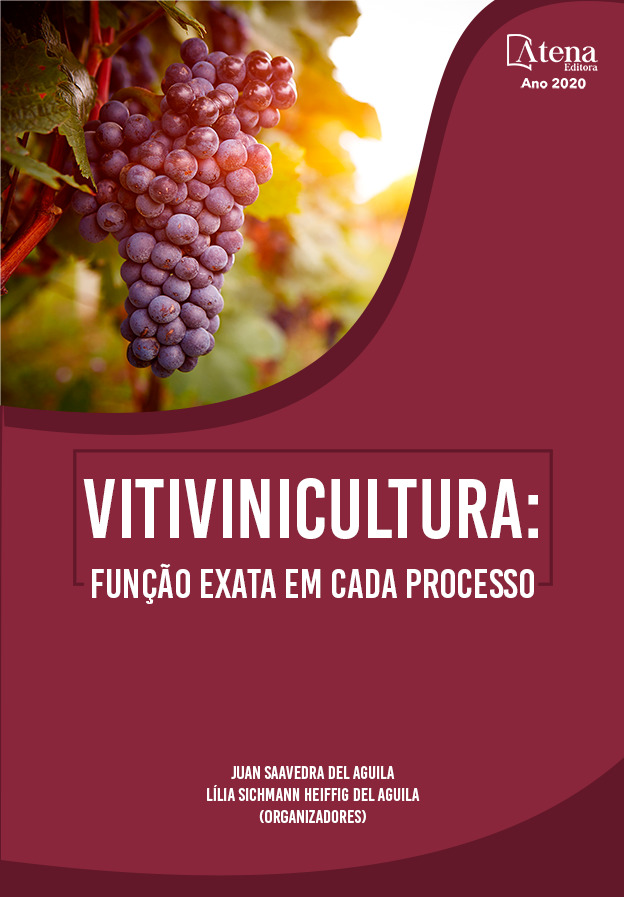
Trichoderma NA QUALIDADE DE UVAS ‘CHARDONNAY’ EM DOM PEDRITO - RS
A utilização de agrotóxicos impacta a biodiversidade ambiental, causando efeitos negativos ao solo, ar e água. Assim, a utilização de tecnologias alternativas como agentes biológicos, torna-se uma necessidade para a sustentabilidade ambiental. Diante disso, objetivou-se avaliar a influência da Trichoderma na qualidade da uva ‘Chardonnay’. O experimento foi realizado em Dom Pedrito - RS, pelo Núcleo de Estudo, Pesquisa e Extensão em Enologia (NEPE²), em vinhedo comercial, plantado há 20 anos, conduzido em sistema espaldeira e enxertado sobre porta-enxerto ‘SO4’. Foram realizadas aplicações de: T1. água na parte aérea (controle); T2. 8ml L-¹ (Trichodel® aéreo) na parte aérea; T3. 8ml L-¹ (Trichodel® aéreo) na parte aérea + 16ml L-¹ no solo (Trichodel® solo) e T4. 16ml L-¹ (Trichodel® solo) no solo. O delineamento estatístico foi o de blocos completamente ao acaso, contendo 14 plantas por tratamento. Foram avaliados: clorofila total, produtividade (kg ha-¹), massa (g), largura e comprimento (cm) do cacho. Em relação ao mosto, foram avaliados: Sólidos Solúveis Totais - SST (ºBrix), pH, acidez total titulável - AT (meq L-1), ácido tartárico (g L-¹), ácido málico (g L-¹), açúcares redutores (g L-¹) e teores de amônia e potássio (g L-¹). Os dados foram submetidos à análise de variância (ANOVA) e teste de Tukey a 5% de probabilidade. A produtividade do T4 (6,5 t ha-¹) foi superior ao T2 (4,7 t ha-¹). Em relação a largura do cacho, não houve diferença estatística. No mosto, as variáveis, açúcares redutores, potássio, amônia, ácido málico e SST não apresentaram diferenças estatísticas, todavia, os níveis de pH mostraram-se inferiores no tratamento T4, que consequentemente apresentou maiores índices de acidez. A aplicação de Trichoderma em solo (T4) apresentou ser a alternativa mais vantajosa.
Trichoderma NA QUALIDADE DE UVAS ‘CHARDONNAY’ EM DOM PEDRITO - RS
-
DOI: 10.22533/at.ed.4292028092
-
Palavras-chave: Vitis vinifera L; Controle Biológico, Ecologia, Vitivinicultura.
-
Keywords: Vitis vinifera L; Biological Control, Ecology, Viticulture.
-
Abstract:
The use of pesticides impacts environmental biodiversity, causing negative effects on soil, air and water. Thus, the use of alternative technologies such as biological agents becomes a necessity for environmental sustainability. Thus, the objective of this study was to evaluate the influence of Trichoderma on the quality of 'Chardonnay' grapes. The experiment was carried out in Dom Pedrito - RS, by the Center for Study, Research and Extension in Oenology (NEPE²), in a commercial vineyard, planted 8 years ago, conducted in a spreader system and grafted on 'SO4' rootstock. Were applied: T1 = water in the aerial part (control); T2 = 8ml L-¹ (Trichodel® aerial) in the aerial part; T3 = 8ml L-¹ (Trichodel® aerial) on the shoots + 16ml L-¹ on soil (Trichodel® soil) and T4 = 16ml L-¹ (Trichodel® soil) on soil. The statistical design was completely randomized blocks containing 14 plants per treatment. Total chlorophyll, yield (t ha-¹), mass (g), width and length (cm) of bunch were evaluated. Regarding the must, it was evaluated: Total Soluble Solids - TSS (ºBrix), pH, total titratable acidity - TA (meq L-¹), tartaric acid (g L-¹), malic acid (g L-¹), reducing sugars (g L-¹) and ammonia and potassium contents (g L-¹). Data were submitted to analysis of variance (ANOVA) and Tukey test at 5% probability. The yield of T4 (6.5 t ha-¹) was higher than T2 (4.7 t ha-¹). Regarding the width of the bunch, there was no statistical difference. In the must, the variables, reducing sugars, potassium, ammonia, malic acid and TSS did not present statistical differences, however, the pH levels were lower in the T4 treatment, which consequently presented higher acidity indices. Trichoderma application in soil (T4) is the most advantageous alternative in ‘Chardonnay’.
-
Número de páginas: 12
- Lara do Canto Simioni
- Yasmin da Costa Portes
- Sara Aparecida da Silva Pinto
- Aline da Silva Tarouco
- Daniel Pazzini Eckhardt
- Lília Sichmann Heiffig-del Aguila
- Juan Saavedra del Aguila


